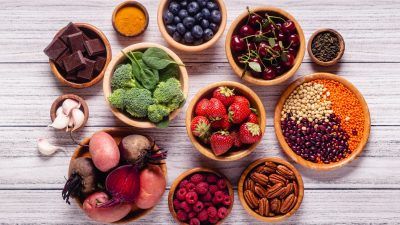6 Ways to Nurture your Gut Microbiome

Our whole body is home to trillions of microbes. These microbes – or microbiota – are collectively referred to as the microbiome. According to Dr Will Bulsiewicz, author of Fibre Fuelled, there are as many microbes on the end of our thumb as there are people in the UK. Our body is home to 39 trillion microorganisms, and 38 trillion of those reside in our gut. And like a fingerprint, everyone’s microbiome is different depending on many factors including our mother’s microbiome, our childhood experiences (eg where we grew up, whether we had a companion animal etc), medications we’ve taken and, of course, our diet.
Most of the microbes inhabiting our body are bacteria (alongside some fungi and viruses) but unlike harmful strains such as Salmonella and E. coli, the majority of the microbes in our gut are ‘friendly’ bacteria.
As scientists study the fascinating world of the microbiome, we are learning that these microbes don’t just play an important role in our digestion, but may affect our immune system, our mood and even our genetic expression. One of the most fascinating aspects of the gut microbiome is the connection between the gut microbiota and the central nervous system. The gut microbiome can directly communicate with the brain and influence how it functions. Is it you or your gut bacteria craving those tortilla chips?
Although everyone’s gut microbiome is unique, a healthy gut microbiome is generally considered one which contains a large diversity of different types of bacteria, not just one or two dominant strains. While a healthy gut microbiome has a positive influence on our health, an unhealthy, or imbalanced gut microbiome – known as dysbiosis – has the opposite effect.
If we treat our gut microbiome well, it will reward us with better health. As “diet has a major impact on gut microbiota composition, diversity, and richness” here are six dietary changes you can make to nurture your microbiome.
1. Feed them fibre
Fibre is the fuel for our microbiota and without it they cannot survive. There are different types of fibre, which act differently in the gut.
Soluble fibre dissolves in water to form a gel, which makes you feel full for longer and makes stools soft and easier to pass. It slows the body’s absorption of glucose from food and so reduces blood sugar spikes which, over time, can increase the risk of diabetes. Soluble fibre is fermented by the microbiota, causing them to release short chain fatty acids which have many health benefits, including maintaining a healthy gut, weight management, reducing inflammation, preventing colon cancer and aiding cognitive function.
Insoluble fibre is tougher and does not dissolve but absorbs water, increasing stool bulk and helping to keep you regular by speeding the passage of food and waste through your gut. Then there are resistant starches which are both insoluble and soluble. They are ‘resistant’ to digestion in the small intestine but when they pass through to the large intestine, they become soluble and are slowly fermented by the microbiota living there.
Most plant foods contain a mixture of all these types of fibre. Soluble and insoluble fibres are found in pulses, vegetables, nuts, seeds, fruits and cereals. Resistant starches, however, can only be found in foods such as oats, pulses, tubers (eg potatoes and yams), and non-mature fruits like green bananas.
2. Feast on fermented food
In 2021, researchers at Stanford School of Medicine found that “a diet rich in fermented foods enhances the diversity of gut microbes and decreases molecular signs of inflammation.”
When study participants were fed fermented foods such as kefir, kombucha, kimchi and other fermented vegetables for 10 weeks, they experienced an increase of microbial diversity and the inflammatory proteins measured in their blood also decreased, when compared to those just eating a high-fibre diet without the fermented foods.
Plant-based fermented foods include: tempeh, sauerkraut, kimchi, dairy-free kefir, kombucha, and sourdough bread.
3. Sprout all about it!

Sprouting is a next-level plant-based pastime. A sprouted seed or legume may be small but they pack a nutritional punch more powerful than their mature counterpart. A sprouted seed or legume has a higher amount of protein, fibre and many vitamins and minerals than the mature plant. This makes them a great source of food for us and our gut bacteria.
What’s more, broccoli sprouts contain up to 100 times more of the phytonutrient sulforaphane than mature broccoli – a chemical that has been linked to reduced risk of cancer, improved heart health and stabilising blood-sugar levels.
4. Pump up the polyphenols
Polyphenols are compounds found in plants that act as antioxidants, giving us important health benefits. Antioxidants are best known for defending against free radicals and reducing oxidative stress but they also play a role in maintaining a healthy gut microbiome.
A 2018 scientific review concluded that polyphenols “contribute to the maintenance of gut health by the modulation of the gut microbial balance. Polyphenols act by enhancing the growth of beneficial bacteria and inhibiting the growth of pathogens, thus exert prebiotic-like effects.”
Polyphenols are found across the plant kingdom but foods particularly high in them include: berries, nuts, olives, spices, flaxseed, dark chocolate, coffee and tea.
5. Life is better after 30
Instead of focusing on one or two so-called ‘superfoods’, we should be focusing on eating the greatest variety of plant foods we can.
A 2016 scientific review found that “the more diverse the diet, the more diverse the microbiome and the more adaptable it will be to perturbations.” In other words, a diverse microbiome is more resilient “because if one microbe is unable to fulfil its function, another is available to step in.”
Even gut bacteria have food preferences, so to make sure none are going hungry, or even dying out, aim to eat at least 30 different types of plants a week.
6. So long sugar!
As if we needed any more reasons to limit our sugar intake, along comes another:
A 2020 review in Nutrients, found that a diet high in sugar not only reduced the diversity of the gut microbiota but also increased the prevalence of a pro-inflammatory type of bacteria:
“High dietary sugar was found to drive changes in microbiota composition, specifically decreasing bacterial diversity and the abundance of Bacteroidetes and increasing the abundance of Proteobacteria […] The observed microbial changes induced by high dietary sugar […] share common features with microbiota dysbiosis associated with metabolic disorders, inflammatory bowel diseases (IBD) and other human disorders.”
There is little evidence as to how artificial sweeteners affect the gut microbiome in humans, but there is a growing concern that they could also have deleterious effects.
We’re all very aware of the important ecosystems on Earth but we rarely think of ourselves as an important one too. Just as our own health and the health of the planet are intrinsically linked, so too is our well-being and the well-being of our gut microbiota. Nourish the gut and the gut will nourish us!







